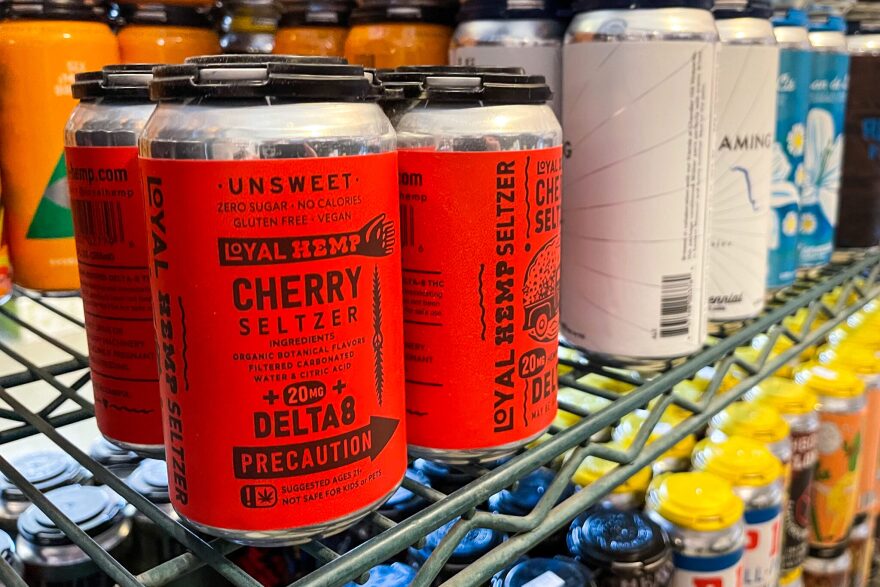Missouri Gov. Mike Parson issued an angry letter to Secretary of State Jay Ashcroft for rejecting a slate of emergency rules aimed at curtailing hemp-derived edibles and beverages at businesses with liquor licenses.
But Ashcroft said his decision to go against his fellow Republican on this issue has nothing to do with politics or the substance of the rules — but rather a lack of evidence from Parson that the rules constitute an emergency.
“I have the responsibility under the statute to protect the right of the people of this state to make sure that if a rule is put into place without going through notice and public comment, that it meets certain requirements,” Ashcroft said in an interview. “This rule didn't.”
Earlier this month, Parson issued an executive order taking aim at “unregulated psychoactive cannabis products.” Among other things, the executive order directed the Missouri Division of Alcohol and Tobacco Control to issue rules stating that “unregulated psychoactive cannabis products are prohibited from being sold on the premises of a liquor-licensed facility.”
That state department sent emergency rules to Ashcroft’s office. Emergency rules go into effect faster than those going through the regular rulemaking process, which often includes a lengthy period for public comments and feedback. Ashcroft said that the rules don’t constitute an emergency — which prompted Parson to issue a letter stating he was “extremely disappointed.”

“There is no principled reason why this emergency rulemaking cannot proceed,” Parson wrote. “If you truly believe the statutory requirements for an emergency rulemaking are not met, I fear how many children must consume these harmful products before you think an emergency exists.”
Parson accused Ashcroft of retaliating against him. Parson supported Lt. Gov. Mike Kehoe in this month's GOP gubernatorial primary, which Kehoe won.
“This is a personal matter for thousands of parents and grandparents across the state,” Parson wrote. “And denying the rulemaking is your attempt at retribution for my endorsement of another candidate. Safety of kids is not a political issue. I am disgusted you are making it one.”
In an interview with St. Louis Public Radio, Ashcroft flatly denied that his decision was based on Parson’s endorsement of Kehoe. He added he endorsed Kehoe shortly after he lost the race.

Ashcroft stressed that the decision was not about his personal feelings about the hemp-derived products — but rather his conclusion that Parson’s office didn’t make the case that the rules met statutory guidelines to go around a potentially robust public comment period.
“I pointed out where I felt what was going on did not meet the law to the executive branch, and they were unable to provide me any information showing that it met the law,” Ashcroft said. “So what other choice did I have to make? I could either follow the law or I could break it. And I'm going to follow the law.”
Ashcroft added that Parson sent his office a new slate of emergency rules after the rejection — and that it will take several days to review. If Ashcroft ends up rejecting those emergency rules, which he has done before in nearly eight years in office, then Parson’s proposal will go through a process that could be concluded sometime next year.
“I swore an oath to the constitution and to uphold the state statutes, and I have to do that,” Ashcroft said. “We don't have a dictatorship. We have a process that has to be followed.”
Parson spokesman Johnathan Shiflett said in an email that the governor is confident his emergency regulations meet statutory requirements.
"As the rules are meant to protect Missouri children and the Secretary himself couldn’t identify a deficiency, what else are we to believe other than the Secretary acting on hurt feelings and petty politics?" Shiflett said.
‘It’s encouraging’
Andrew Mullins is the executive director of MoCannTrade, which represents companies that participate in the state-regulated marijuana industry.
Mullins blasted Ashcroft for rejecting the governor’s rules, adding that if he “sincerely doesn’t believe that kids getting high from buying dangerous [products] from Missouri gas and convenience stores isn’t an emergency, we would suggest he talk to law enforcement, who have long wanted these unsafe, intoxicating products banned.”
But Ashcroft’s rejection of the emergency rules got a decidedly different reaction from businesses associated with the hemp industry, which have criticized Parson’s move as “overreach” against a legitimate industry.
J.D. McCormick of the MO Hemp Trade Association praised Ashcroft’s decision, adding that similar executive orders in other states produced thousands of negative comments — something that could happen now under a non-emergency rule process.
“It's encouraging, and we applaud Secretary Ashcroft for standing up for small businesses and recognizing the legal deficiencies of an emergency rule with no precursor emergency,” McCormick said. “These products help people. These products have built thousands of small businesses in the state of Missouri. And for the secretary to step out into the breach and stand up for the little guy is incredible.”
McCormick said businesses who are part of the MO Hemp Trade Association are in favor of legislation that would institute packaging restrictions and testing standards. But he added what Parson was trying to do amounted to a “protectionist” posture to help companies that participate in the state-regulated marijuana industry.
“All of our hemp products are federally legal. These businesses are licensed by the state of Missouri,” McCormick said. “And as we move through this, I think it's pretty clear to anyone paying attention, we're the only real competitors to the marijuana industry.”






